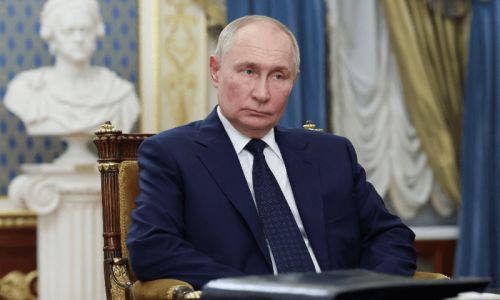WASHINGTON: British Prime Minister Keir Starmer and US President Joe Biden on Friday delayed a decision to let Ukraine fire long-range Western-supplied missiles into Russia, a plan that sparked dire threats from Moscow of a war with Nato.
On Saturday, Moscow and Kyiv swapped 103 prisoners of war each in a deal brokered by the United Arab Emirates.
UK PM Starmer told reporters at the White House that he had a “wide-ranging discussion about strategy” with Biden but that it “wasn’t a meeting about a particular capability.”
Before the meeting, officials had said Starmer would press Biden to back his plan to send British Storm Shadow missiles to Ukraine to hit deeper inside Russia as allies become increasingly concerned about the battlefield situation.
Moscow, Kyiv swap 206 prisoners in UAE-brokered deal
But the Labour leader indicated that he and Biden would now discuss the plan at the UN General Assembly in New York the week after next “with a wider group of individuals.”
During the meeting at the White House, Biden played down a warning by Russian President Vladimir Putin that allowing Ukraine to fire the weapons would mean the West was “at war” with Russia.
Biden is understood to be reluctant to grant Ukraine’s insistent demand to be able to use long-range US-made ATACMS missiles against Russian territory.
US officials believe the missiles would make a limited difference to Ukraine’s campaign and also want to ensure that Washington’s own stocks of the munitions are not depleted. The two leaders said they also discussed the war in Gaza, with Britain having recently suspended arms deliveries to Israel over concerns that they could be used to violate international humanitarian law.
Biden and Starmer agreed on their “ironclad commitment” to Israel — but stressed the “urgent need” for a ceasefire deal and a “need for Israel to do more to protect civilians” in Gaza, the White House said in a readout.
‘West is Afraid’
Ukrainian President Volodymyr Zelensky, however, pushed Kyiv’s Western allies to do more.
Speaking in Kyiv, Zelensky accused the West of being “afraid” to even help Ukraine shoot down incoming missiles as it has done with Israel.
Russia has reacted angrily to the prospect of the West supplying long-range weapons to the country it invaded in February 2022.
As part of the deal, Russia released prisoners who were captured during Ukraine’s incursion into the Kursk region, Moscow said, while some of the Ukrainians freed had been held prisoner since Moscow seized the Azovstal steel plant in May 2022.
“Another 103 soldiers were returned to Ukraine from Russian captivity,” President Zelensky said on Telegram. Among the freed were 82 privates and sergeants as well as 21 officers, Zelensky said.
Russia confirmed it had “handed over” 103 Ukrainian army prisoners, and received 103 Russian servicemen in return.
“At present, all Russian servicemen are on the territory of the Republic of Belarus, where they are being provided with the necessary psychological and medical assistance, as well as an opportunity to contact their relatives,” the Russian defence ministry said.
The UAE’s foreign ministry hailed the deal as a “success” and thanked both sides for their cooperation on Saturday.
Russian advances
The prisoner swap came as Russia pushed ahead in east Ukraine, where it claims to have captured a string of villages in recent weeks.The Russian defence ministry said in a daily briefing it had “liberated” the village of Zhelanne Pershe, less than 30 kilometres from the key Ukrainian-held logistics hub of Pokrovsk.
Published in Dawn, September 15th, 2024














































Dear visitor, the comments section is undergoing an overhaul and will return soon.